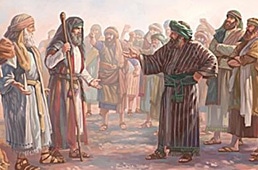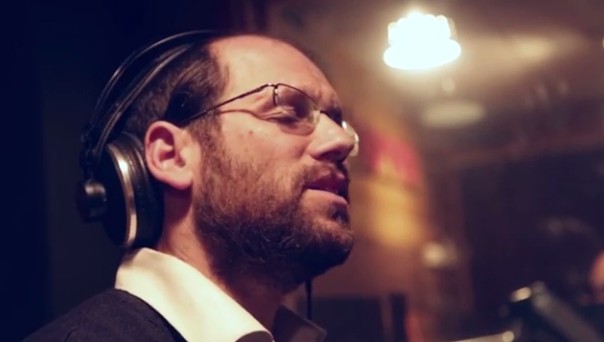
Like Father, Like Sons?



Shalom,
This week’s Torah portion “Korah” tells us about the rebellion of Korah against Moses and Aaron.
Korah was a great-grandson of Levi, the third of Jacob’s twelve sons, and a first cousin to Moses and Aaron.
Korah was jealous of the fact that Aaron had been chosen as High Priest, to the exclusion of anyone else.
Furthermore, his cousin Elitzafan had been chosen as head of the Levite family of Kehot, to which Korah belonged, and Korah felt this position was rightfully his.
These personal grievances led Korah to stage a full-blown rebellion.
He rallied an additional 250 community leaders to his cause. Together, they confronted Moses and Aaron and claimed that he had appointed his brother as High Priest on his own accord, without being instructed to do so by G‑d.
They further demanded that they all be allowed to serve as High Priests.
Moses responded that this was impossible, as only one person could assume this sacred post.
וַיֹּאמֶר מֹשֶׁה, אֶל-קֹרַח: שִׁמְעוּ-נָא, בְּנֵי לֵוִ
הַמְעַט מִכֶּם, כִּי-הִבְדִּיל אֱלֹהֵי יִשְׂרָאֵל אֶתְכֶם מֵעֲדַת יִשְׂרָאֵל, לְהַקְרִיב אֶתְכֶם, אֵלָיו–לַעֲבֹד, אֶת-עֲבֹדַת מִשְׁכַּן יְהוָה, וְלַעֲמֹד לִפְנֵי הָעֵדָה, לְשָׁרְתָם
וַיַּקְרֵב, אֹתְךָ, וְאֶת-כָּל-אַחֶיךָ בְנֵי-לֵוִי, אִתָּךְ; וּבִקַּשְׁתֶּם, גַּם-כְּהֻנָּה
לָכֵן, אַתָּה וְכָל-עֲדָתְךָ–הַנֹּעָדִים, עַל-יְהוָה; וְאַהֲרֹן מַה-הוּא, כִּי תלונו עָלָיו
And Moses said unto Korah: ‘Hear now, ye sons of Levi:
Is it but a small thing unto you, that the God of Israel hath separated you from the congregation of Israel, to bring you near to Himself, to do the service of the tabernacle of the LORD, and to stand before the congregation to minister unto them.
And that He hath brought thee near, and all thy brethren the sons of Levi with thee? and will ye seek the priesthood also?
Therefore thou and all thy company that are gathered together against the LORD–; and as to Aaron, what is he that ye murmur against him?’
(Numbers 16, 8-11)
Moses tried to settle the dispute, but Korah and his people were adamant in their demands.
Then Moses foretold of the punishment that would befall them: the earth would open its mouth and swallow them alive.
As Moses finished speaking, the earth indeed opened up and swallowed Korah and his two cohorts along with their families and possessions, never to be seen again. At the same time, a Heavenly fire went forth and consumed the 250 incense-bearers.
Korah was extremely wealthy, until today we use the Hebrew expression:
עשיר כקורח (ASHIR KA’KORAH) – wealthy as Korah
and was a clever and astute individual.
His status as a member of the Levite tribe enabled him to participate in the service in the Mishkan, the portable sanctuary the Jews carried with them throughout their journey to the Promised Land.
Despite—and because of his many qualities, he felt able to take a stance against Moses and Aaron, which ultimately led to his downfall.
Like Father, Like Sons?
It is worth mentioning that at first, Korah’s three sons, Asir, Elkanah and Aviasaf, joined in their father’s quarrel. However, soon after, they regretted their actions and repented.
As a result, they were spared their father’s fate and survived.
The book of Psalms – תהלים
Psalms is popularly known as the book of King David.
However, the Talmud enumerates ten authors other than King David. “David composed the Book of Psalms through ten elders: Adam, Melchizedek, Abraham, Moses, Heiman, Yedutun, Asaph, and the three sons of Korah.”
Although many psalms were originally composed by others, it was King David’s recital that established them as immortal songs of praise.
Because during his entire life, King David was immersed in the constant recitation of psalms. In times of trouble and success, as a hunted fugitive and as the victorious king at the pinnacle of royalty and greatness, his lips never ceased to sing the praises of G‑d.
Psalms is the only book in the Bible that is compared to the Torah itself. More than just a collection of beautiful songs composed by various authors, it is considered the “Bible of Prayer.” Just as all of Torah is sourced in the five books of Moses, prayer in Judaism is sourced in the five books of Psalms.
Indeed, Korah’s descendants were among the Levites who sang in Holy Temple, and a number of psalms in the Book of Psalms were either composed or sung by them.
The Sons of Korah have eleven psalms attributed to them (Psalm 42, 44 – 49, 84, 85, 87 and 88).
Listen now to a song based on one of these psalms – 42:2
כְּאַיָּל, תַּעֲרֹג עַל-אֲפִיקֵי-מָיִם– כֵּן נַפְשִׁי תַעֲרֹג אֵלֶיךָ אֱלֹהִים
As the hart panteth after the water brooks, so panteth my soul after Thee, O God
https://www.youtube.com/watch?v=jFehxSn4Y-8
Among Korah’s descendants was the famed prophet Sh’muel, who anointed of the first kings of Israel, Shaul and David.
And now a little bit of Hebrew:
The rebellious act of Korah and the others who joined him is referred as:
מחלוקת קורח ועדתו
The dispute of Korah and his company
- Dispute, discourse – מַחֲלוֹקֶת – (MAHLOKET) comes from the root חלק – part. It sets people apart from each other.
Pay attention to the sound pattern of the word MAHLOKET – MA… O… ET
Some other useful Hebrew words have the same sound pattern:
-
Salary – מַשְׂכּוֹרֶת – (MASKORET) comes from the root שכר – reward.
-
Trap – מַלְכּוֹדֶת – (MALKODET) comes from the
root לכד – capture. -
Necklace – מַחֲרוֹזֶת – (MAHROZET) comes from the
root חרז – put beads together (also – rhyme).
Shabbat Shalom
Yoel & Orly
Our archive of posts and newsletters may be found at:
https://www.ulpanor.com/category/newletter/








